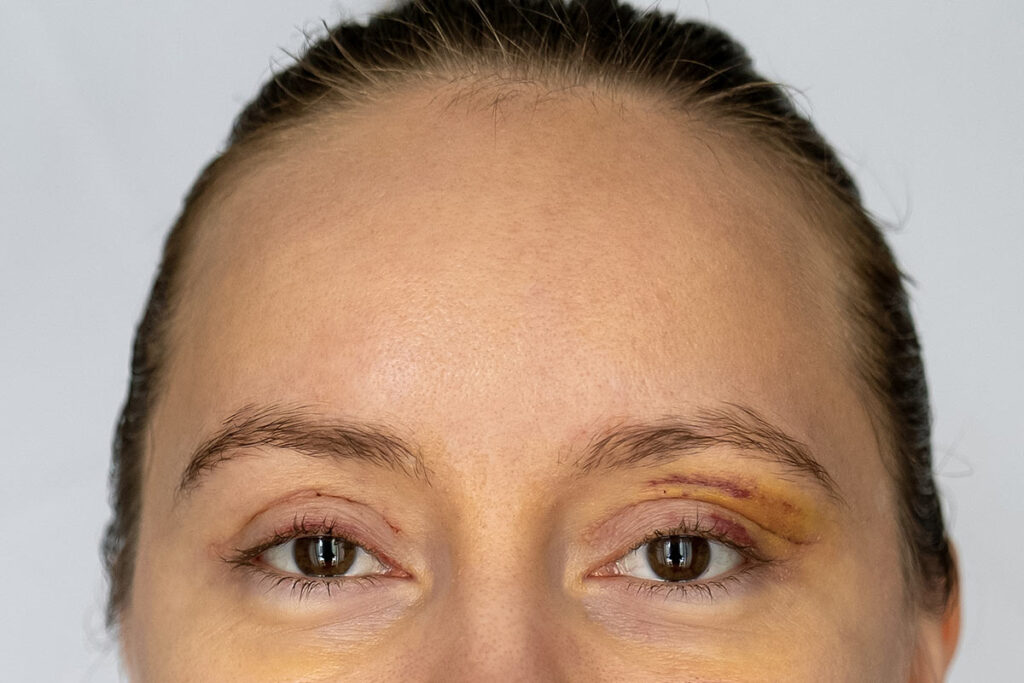Whether you’ve had an upper or lower eyelid lift, also known as a blepharoplasty, you’ll need time afterward to recover and heal from the surgery. For the most part, the initial recovery after blepharoplasty takes about a week, but some people might need a few extra days before they feel ready to head back to work. After the initial recovery, you’ll want to continue to limit certain activities until your surgeon gives you the all clear.
Recovering from surgery can be a bit uncomfortable, as you might be dealing with some post-operative pain, swelling, and in the case of eyelid surgery, some dryness or itchiness in the eyes. There are a few things you can do to make your recovery time a bit more comfortable.

How Long is How Long is Recovery From Blepharoplasty?
The recovery time for blepharoplasty varies, but most patients can expect initial swelling and bruising to subside within 10 to 14 days. Stitches are usually removed within the first week, and many people feel comfortable returning to work after one to two weeks. While you may resume light activities fairly quickly, full recovery—including complete resolution of swelling and final results—can take a few months. Following your surgeon’s post-operative care instructions is essential for a smooth healing process.
Tips for Optimal Healing During Blepharoplasty Recovery
Proper post-operative care is essential for a smooth and comfortable recovery. While some swelling and bruising are expected, taking the right precautions can help you heal faster and with less discomfort. Below are expert-approved tips to help you recover more efficiently and achieve the best possible results.
1. Keep Your Head Up
Swelling and bruising occur after eyelid surgery due to fluid buildup in the area. While time is the best remedy, you can take steps to speed up the healing process. Keeping your head elevated is crucial, as it helps prevent fluid from pooling around your eyes. Instead of lying flat, use several pillows to prop your head and neck up while resting. If sitting, a recliner can make it easier to maintain elevation. Additionally, applying a cold compress around the eyes can help reduce swelling and discomfort.
2. Let Your Eyes Rest
Giving your eyes adequate rest after blepharoplasty is crucial for a smooth recovery. Activities such as watching TV, reading, or using a computer can strain your eyes and cause unnecessary discomfort. During the first few days post-surgery, limit screen time and opt for activities that don’t require visual focus. Audiobooks or podcasts can be great alternatives to keep entertained while allowing your eyes to heal. Keeping your eyes closed and using a cold compress can also help alleviate dryness and irritation.
3. Limit the Salt Intake
Maintaining a healthy diet is essential for a smooth recovery, and limiting salt intake can significantly reduce swelling after blepharoplasty. Sodium causes the body to retain excess fluid, which can lead to increased puffiness around the eyes. Processed foods, take-out meals, and pre-packaged options tend to be high in sodium, so it’s best to prepare meals at home with fresh ingredients. Planning and freezing healthy, low-sodium meals before surgery can make post-operative recovery easier while ensuring a diet that promotes faster healing.
4. Protect Your Eyes
Avoiding sun exposure after an eyelid lift is crucial for both the skin around the eyes and the eyes themselves. Your eyes may be more sensitive to bright light in the weeks following surgery, so wearing sunglasses whenever you go outside is highly recommended. Sunglasses also provide protection from airborne irritants like dust and pollen, which could cause discomfort or irritation. In addition, consider using lubricating eye drops if your eyes feel dry, and avoid rubbing or touching the area unnecessarily.
5. Add Activities Slowly
While you might feel ready to jump back into your routine shortly after surgery, it’s important to ease into physical activities gradually. Avoid strenuous exercises, heavy lifting, and any activity that increases blood pressure for at least a few weeks. However, taking short, gentle walks a day or two after surgery can promote circulation and prevent stiffness. Listen to your body and consult your surgeon before resuming workouts. Prioritizing rest while incorporating movement slowly will contribute to a smoother recovery.
6. Follow Your Surgeon’s Instructions
Your surgeon will provide detailed post-operative instructions tailored to your specific case, and following them is essential for a successful recovery. These guidelines may include how to care for your incisions, when to resume certain activities, and what medications to take or avoid. Ignoring post-surgical care instructions can lead to complications or delayed healing. If you have any concerns or experience unusual symptoms, consult your surgeon promptly. Adhering to professional advice ensures the best results and minimizes the risk of complications.
Before making any decisions about your blepharoplasty procedure, it’s essential to take the recovery process seriously. Proper aftercare not only ensures a smooth healing journey but also maximizes the effectiveness of the surgery, leading to the best possible aesthetic results. Every patient heals at their own pace, but by following the expert tips above, you can minimize discomfort and avoid complications.
Choosing the Best Eyelid Surgery Specialist
The success of a blepharoplasty procedure depends not only on the surgery itself but also on the expertise of your surgeon. Eyelid surgery is a delicate procedure requiring a deep understanding of facial anatomy and precision in execution. Choosing a highly specialized and board-certified surgeon minimizes risks and ensures the most natural-looking results.
At The Naderi Center, our facial plastic surgery specialist specializes in facial rejuvenation, including blepharoplasty. As an expert focused exclusively on aging face procedures, our specialist has the expertise and artistic eye needed to perform this intricate surgery with exceptional results. If you’re considering eyelid surgery, schedule a consultation with our specialist today by calling us at 301-222-2020 (Chevy Chase), 703-481-0002 (Reston), or visiting our contact page!